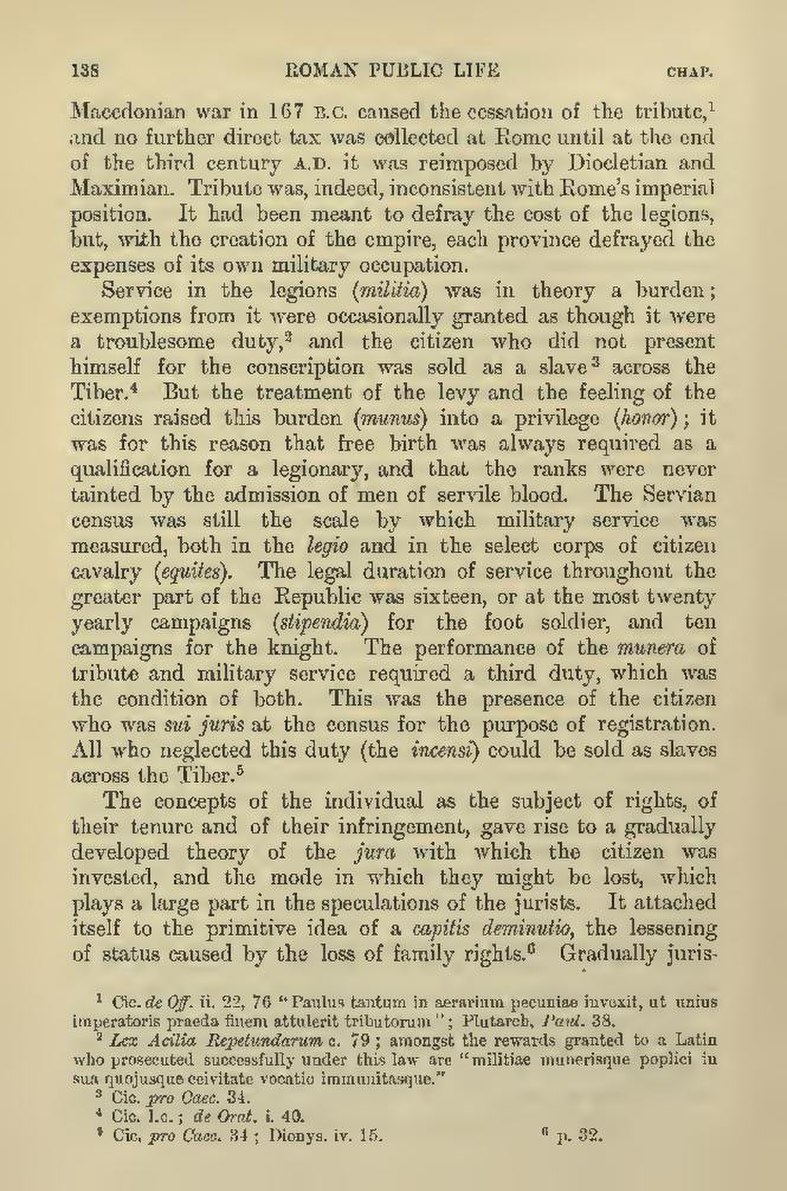Macedonian war in 167 B.C. caused the cessation of the tribute,[1] and no further direct tax was collected at Rome until at the end of the third century A.D. it was reimposed by Diocletian and Maximian. Tribute was, indeed, inconsistent with Rome's imperial position. It had been meant to defray the cost of the legions, but, with the creation of the empire, each province defrayed the expenses of its own military occupation.
Service in the legions (militia) was in theory a burden; exemptions from it were occasionally granted as though it were a troublesome duty,[2] and the citizen who did not present himself for the conscription was sold as a slave[3] across the Tiber.[4] But the treatment of the levy and the feeling of the citizens raised this burden (munus) into a privilege (honor); it was for this reason that free birth was always required as a qualification for a legionary, and that the ranks were never tainted by the admission of men of servile blood. The Servian census was still the scale by which military service was measured, both in the legio and in the select corps of citizen cavalry (equites). The legal duration of service throughout the greater part of the Republic was sixteen, or at the most twenty yearly campaigns (stipendia) for the foot soldier, and ten campaigns for the knight. The performance of the munera of tribute and military service required a third duty, which was the condition of both. This was the presence of the citizen who was sui juris at the census for the purpose of registration. All who neglected this duty (the incensi) could be sold as slaves across the Tiber.[5]
The concepts of the individual as the subject of rights, of their tenure and of their infringement, gave rise to a gradually developed theory of the jura with which the citizen was invested, and the mode in which they might be lost, which plays a large part in the speculations of the jurists. It attached itself to the primitive idea of a capitis deminutio, the lessening of status caused by the loss of family rights.[6] Gradually juris-*
- ↑ Cic. de Off. ii. 22, 76 "Paulus tantum in aerarium pecuniae invexit, ut unius imperatoris praeda finem attulerit tributorum"; Plutarch, Paul. 38.
- ↑ Lex Acilia Repetundarum c. 79; amongst the rewards granted to a Latin who prosecuted successfully under this law are "militiae munerisque poplici in sua quojusque ceivitate vocatio immunitasque."
- ↑ Cic. pro Caec. 34.
- ↑ Cic. l.c.; de Orat. i. 40.
- ↑ Cic. pro Caec. 34; Dionys. iv. 15
- ↑ p. 32.
